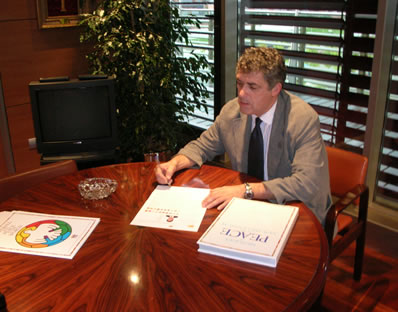By Paul Nicholson
June 2 – Angel Maria Villar Llona, the controversial president of the Spanish Football Federation (RFEF) and current interim president at UEFA, has been summoned to appear in court in Spain in July charged with deliberately delaying presidential elections at the RFEF.
Villar Llona, a FIFA vice-president who was previously sanctioned by FIFA for failing to co-operated fully with FIFA’s ethics investigators into the 2018 and 2022 World Cup bidding probe, is being charged with “alleged malfeasance” under Article 404 of the Criminal Code.
He will first appear in court on June 23 and then testify as a defendant on September 15.
The charge was been filed by presidential rival Miguel Galan in the Court of Instruction of Majadahonda against Villar Llona alleging that he has deliberately delayed the electoral process and in doing so has violated a ministerial order that is enshrined in Spanish law.
Galan specifically calls for Villar Llona to be disqualified from public office and to be banned from standing for election – which under this rule has a disqualification period of nine to 15 years.
As evidence of Villar Llona’s manipulation Galan has filed 29 documents and asked that the court take evidence from Spanish sports minister Miguel Cardenal, La Liga president Javier Tebas, and current Spanish federation general secretary and presidential candidate Jorge Perez.
Galan believes the elections should have been held in the first third of the year as provided in the Sports Act for the Olympic federations.
Villar Llona is understood to planning a bid for the presidency of UEFA, though has not yet declared his candidacy formally. The timing of the Spanish court case will help neither his ambitions nor his reputation. The UEFA presidential election takes place September 14 in Greece at an extraordinary congress – the day before he is due to testify in Spain. Candidates have to declare by July 20.
Long regarded as having an old-school approach to ethics and transparency in what (until FIFA’s Congress voted in the other direction in Mexico City) was meant to be a new era of reform, he was the only member of FIFA’s executive committee who voted against giving ethics investigators greater transparency in terms of naming people under investigation (see http://www.insideworldfootball.com/2015/10/22/exclusive-villar-was-lone-voice-opposing-fifa-s-name-and-shame-vote/).
Contact the writer of this story at moc.l1715005882labto1715005882ofdlr1715005882owedi1715005882sni@n1715005882osloh1715005882cin.l1715005882uap1715005882

